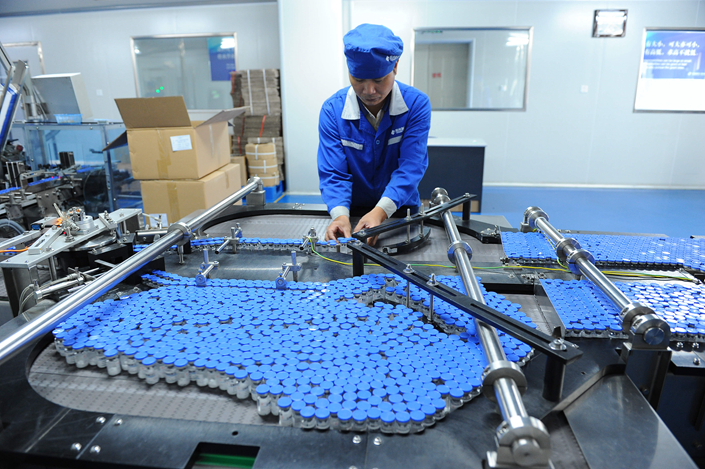Pharmaceutical Giants Find Elixir in Updated China Drug Catalog

(Beijing) — Global pharmaceutical giants like GlaxoSmithKline (GSK) PLC and Pfizer Inc., and big-name local firms like Yifan and Fosun Pharmaceutical, are likely to benefit from inclusion of more of their products in China’s updated catalog of drugs eligible for reimbursement under government-backed insurance plans, analysts said.
The new catalog lists 2,535 drugs eligible for government insurance programs, up from 2,196 in the previous version, published in 2009, according to a statement released late last week on the website of the Ministry of Human Resources and Social Security of the People’s Republic of China.
 |
New to the list is tenofovir disoproxil, a drug for hepatitis B sold as Viread by Britain’s GSK. British rival AstraZeneca PLC saw its lung cancer medicine gefitinib, sold as Iressa, and diabetes medicine Onglyza also added. American firm Eli Lilly and Co. has seen two new products added to the list — cancer injection pemetrexed, sold as Alimta, and diabetes injection insulin lispro protamine, branded as Humalog.
American pharmaceutical company Pfizer had its Caduet, the brand name for high blood pressure drug amlodipine and atorvastatin, added to the list. Its China joint venture, Hisun-Pfizer Pharmaceuticals Co. Ltd., also had two new drugs on the list.
Switzerland’s Novartis got five drugs added to the list, and other global firms to get new entrants included MSD, Boehringer-Ingelheim, Johnson & Johnson, Daiichi-Sankyo, Bristol-Myers Squibb and Takeda Pharmaceutical, said Neil Wang, global partner and Greater China president at consultancy Frost & Sullivan.
“The companies whose medicines have been (newly) included in the list have large potential for increasing sales,” said Zhou Jing, an analyst at Guolian Securities. “For example, ever since Shijiazhuang Pharmaceutical Group’s NBP was listed in 2009, the sales have grown by over 50% each year.”
While inclusion on the list is a positive development, drugmakers must still go through bidding processes to actually get their products into hospitals. In that process, drugs made by foreign companies often lose out to cheaper domestic rivals.
AstraZeneca first launched lung cancer medicine Iressa in 2006, but five years later China’s Betta Pharmaceuticals Co. Ltd. revealed a similar drug, Conmana, which is 25% cheaper. Both drugs are included on the latest list.
“Companies whose medicines have been listed will probably reduce prices to secure deals, which might pressure their profits,” said Zhao Haoran, an analyst at Great Wall Securities.
The 2017 list has included new drugs produced by at least 44 listed Chinese companies. Those with the largest number of entrants include Yifan Pharmaceutical Co. Ltd., with 11 new products; five new ones from Shanghai Fosun Pharmaceutical (Group) Co. Ltd.; and Guizhou Yibai Pharmaceutical Co. Ltd., with four.
Following release of the 2017 list, provincial governments will update their own local lists by the end of July, meaning drugmakers could start earning revenue from new entrants to the list as soon as August, said Wang Wen, an analyst at China Development Bank Securities.
While most changes were positive, some new restrictions could have an adverse effect on their producers. At least 20 types of injections made using Chinese medicine have seen their use more restricted in the new catalog, said Shi Lichen, founder of pharmaceutical consultancy Mskl.
One such example was shuxuetong, an injected medicine for stroke, which was admitted to all levels of hospitals in 2009 but was restricted to large hospitals on the latest list. The medicine has been largely used in community-level clinics but has strong side effects, Shi said.
Another 45 types of drugs, mostly expensive cancer medicine, still require negotiations between the government and pharmaceutical companies over prices before they can be listed. Names of that group have not been disclosed yet.
Contact reporter Coco Feng (renkefeng@caixin.com)

- 1Cover Story: China Carves Out a Narrow Path for Offshore Asset Tokenization
- 2Drownings Shake Chinese Enthusiasm for Travel to Russia
- 3Over Half of China’s Provinces Cut Revenue Targets
- 4Li Ka-Shing’s Port Empire Hit by Forced Takeover Amid Panama Legal Dispute
- 5In Depth: China’s Mutual Fund Industry Faces Overhaul After a Banner 2025
- 1Power To The People: Pintec Serves A Booming Consumer Class
- 2Largest hotel group in Europe accepts UnionPay
- 3UnionPay mobile QuickPass debuts in Hong Kong
- 4UnionPay International launches premium catering privilege U Dining Collection
- 5UnionPay International’s U Plan has covered over 1600 stores overseas





